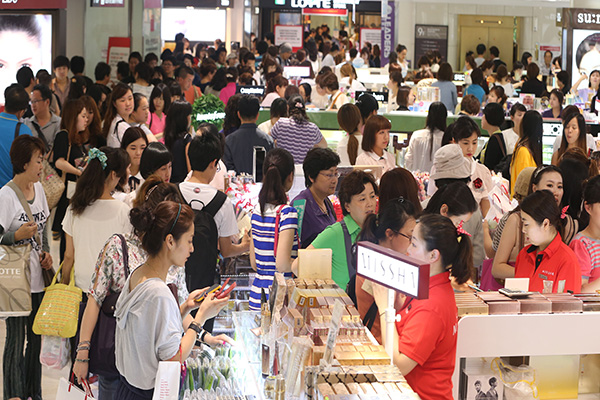|
 |
|
Chinese visitors bustling before cosmetics counters in Lotte Duty-Free Shop in Seoul, South Korea. [Photo/China Daily] |
Chinese women are developing an appetite for South Korean cosmetics because of competitive prices
They giggle and chat as they pick up the "Made in Korea" brands.
At the South Korean beauty store Innisfree in the We Life shopping mall in Beijing's Chaoyang district, a group of college girls with blushed cheeks and tinted pink lips try on different cosmetics in front of a mirror.
The group is a part of an increasing number of beauty-conscious Chinese women who are developing an appetite for South Korean cosmetics because of their innovative products, cute packaging and competitive price ranges.
"I like them because they are well priced, beautifully packaged and are of good quality," Peng Weizhu, a public relations officer in her early 20s and working in Beijing, said. "Besides, they are suitable for Asian people's skin, especially the color and texture of their foundations."
Already, there are seven large South Korean cosmetics manufacturers doing business in China, with 25 of their beauty brands available in online and offline stores. This newfound interest for skincare is generating bumper earnings for South Korea's beauty industry.
Cosmetics producer LG Household & Healthcare, owner of the Face Shop brand, is anticipating strong growth here this year.
"Our company expects annual sales from China to increase by 50 percent in 2015 from 121.1 billion South Korean won ($141.46 million) last year," Park Hee-jung a press representative at LG H&H, said.
Other companies are just as bullish. Amore Pacific Group, South Korea's leading personal care firm, "expects China to contribute 28 percent of the company's global sales by 2020 from the current 10 percent", according to Ji Huilin, the company's public relations officer.
In the first quarter of this year, Amore Pacific generated revenues of 3.4 billion yuan ($535.4 million) from China, Mintel Group Ltd, a market research firm in the United Kingdom, reported.
China has become the largest destination for South Korean cosmetics. South Korea exported $370.8 million worth of cosmetics in the first seven months of this year, an increase of 250.6 percent compared to the same period in 2014, according to the Korean International Trade Association.
